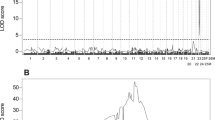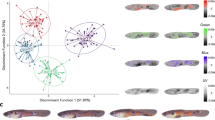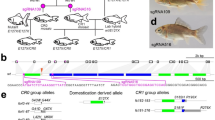Abstract
THROUGH the kindness of Mrs. Sexton, of the Marine Biological Laboratory, Plymouth, I was able to obtain a stock of a new mutation producing red, instead of the normal black, facets in the eyes of the amphipod Gammarus chevreuxi, Sexton. It had appeared in the first F2 of a pair from a dredging taken in Chelson Meadows, near Plymouth, about a year ago, and my intention was to make a study of the effects of temperature on this mutant similar to that made by E. B. Ford and J. S. Huxley (1927) on the first red-eye mutation. For this purpose it was necessary to cross the new form with the red-eye mutations which had previously appeared, in order to determine whether or not it was homologous with any of them.
This is a preview of subscription content, access via your institution
Access options
Subscribe to this journal
Receive 51 print issues and online access
$199.00 per year
only $3.90 per issue
Buy this article
- Purchase on Springer Link
- Instant access to full article PDF
Prices may be subject to local taxes which are calculated during checkout
Similar content being viewed by others
References
Sexton, E. W. and Clark, A. K., NATURE, 131, 201; 1933.
Author information
Authors and Affiliations
Rights and permissions
About this article
Cite this article
YARNOLD, K. A Further Reappearance of the Second Red-Eye Mutation in Gammarus. Nature 135, 832–833 (1935). https://doi.org/10.1038/135832b0
Issue Date:
DOI: https://doi.org/10.1038/135832b0
This article is cited by
-
Persistence of Sperms to a Later Mating in Gammarus
Nature (1935)
Comments
By submitting a comment you agree to abide by our Terms and Community Guidelines. If you find something abusive or that does not comply with our terms or guidelines please flag it as inappropriate.



